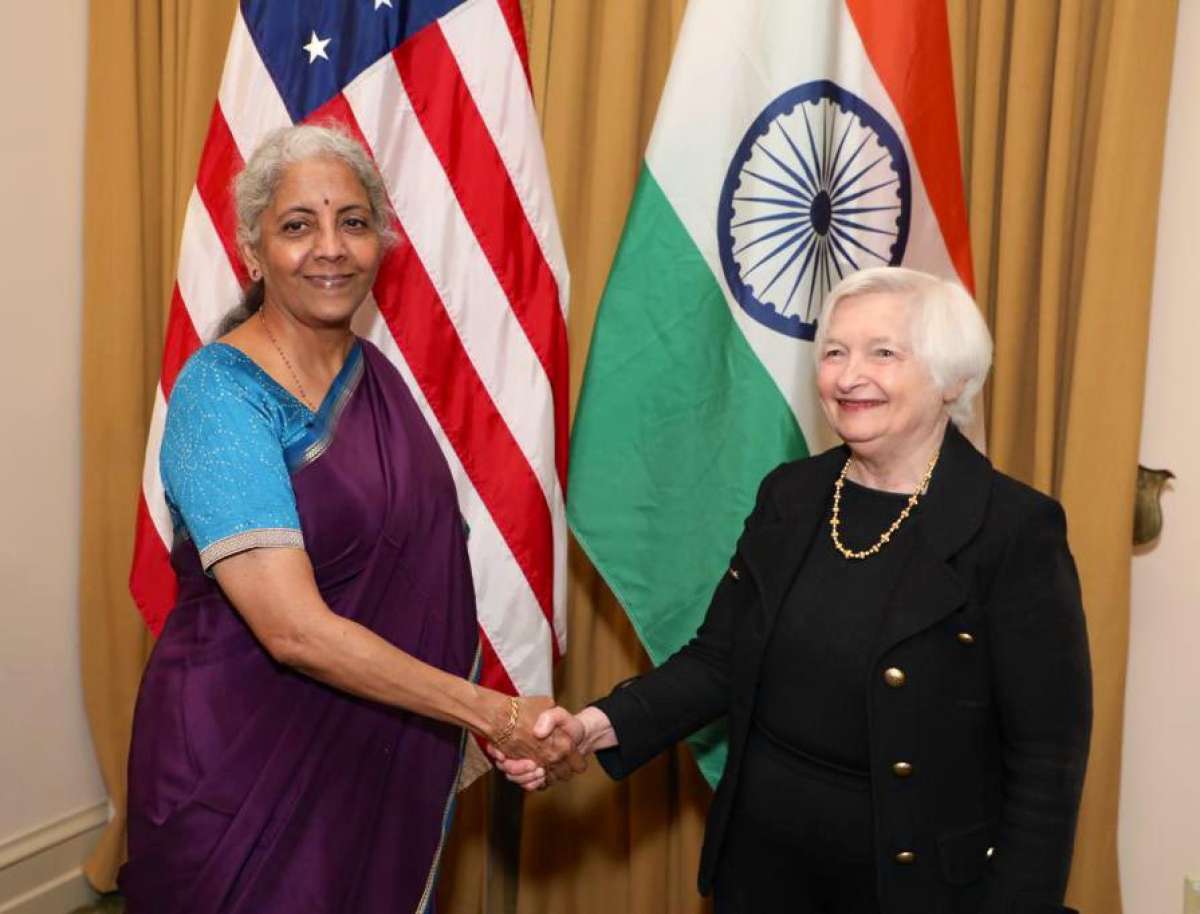Finance Minister Nirmala Sitharaman said strengthening multilateral institutions will be a priority for India in the year-long presidency of the G-20, a report by Yashwant Raj
Strengthening multilateral institutions will be a priority for India in the year-long presidency of the G-20 group of the developed and developing nations that it assumes in coming December, Finance Minister Nirmala Sitharaman said at the US think tank on Tuesday.
The minister, who is in Washington DC for the annual meetings of the World Bank Group, spoke on a wide-range of issues including India’s growth, whose robustness was testified in an IMF report released earlier in the day, the future of reforms and challenges and risks facing India, primarily, in her telling, energy prices and the supply of fertilizers.
“Multi-lateral institutions need to be strengthened, their capacity to deal with pandemics or any such future stressful global developments will have to be battered,” Sitharaman said. India takes over the rotational presidency from Indonesia.
In the last few decades, she added, “institutions existed but problems remain and solutions are not coming through them”.
Asked if she would like to see newer institutions instead, Sitharaman said that she is not against new institutions but she would like to see the improvement of the effectiveness of the existing bodies based on lessons learnt.
India has been calling for the reform of the global multilateral platforms such at the UN Security Council, the IMF and the World Bank to accord more authority and importance to emerging powers. India is seeking a permanent membership in a reformed and expanded UNSC, for instance.
The minister also stressed the need, in the context of the G-20 presidency, for finance to deal with natural disasters that are “far more frequent than we could imagine”. She brought the issue of climate finance, which required developed countries to contribute to the fund that will help developing and less developed countries deal with carbon gas emissions.
Sitharaman said that the climate finance “has not been smooth” despite many meetings. She was referring to the Green Climate Fund, which was created at the Cancun COP (Conference of the Parties) in 2016. But the developed countries have been slow to honour their commitments.
The G-20 group had proven effective in the past. She cited the two-pillar solution to global taxation of multinational companies as an example.
Budget to focus on growth
Finance Minister Nirmala Sitharaman has said that the Union Budget for 2023-24 would be “carefully structured’ where the focus would be on maintaining growth momentum.
Speaking at an event organised by Brookings Institute in Washington, the Finance Minister in a conversation with Cornell University’s Eswar Prasad, said on Tuesday that focus of the forthcoming Union Budget would be on growth priority.
She said that inflation concerns were also there and managing growth would be the main focus.
On being asked about rising public debt and fiscal deficit, Sitharaman said that in the budgets of 2021-22 and 2022-23, the government focussed on increased capital expenditure to revive the economy in the post-pandemic era.
“We understood the virtue of asset creation. We hiked infrastructure spending in the last two budgets but at the same time managed to maintain fiscal prudence,” the Finance Minister said.
Speaking about the immediate risks being faced by India, the Finance Minister said that energy and fertiliser requirements were one of the most immediate challenges the country faces.
She said that there was a limit to which renewable energy infrastructure can be ramped up, but it can’t meet all the energy requirements.
Due to the energy crisis, India has for the time being gone back to thermal energy.
Similarly, while India is capable of producing fertilisers and it is doing so, as well as meeting requirements with the government footing the bill, the demand is rising, she said.
Sitharaman said due to rising international prices of fertilisers there is a crisis and this is an immediate challenge along with energy requirements.
Elaborating on managing the economy during the pandemic days, Sitharaman said that due to the digitalisation of the economy, which had started in 2014 itself, India managed to provide foodgrains to the needy during lockdowns.
Immediate relief was provided to the people due to financial inclusion infrastructure, which the government had already created, she said.
Sitharaman was in conversation with Eswar Prasad on ‘India’s Economic Prospects and Role in the World Economy’ organised by BrookingsInst as part of its ‘State of the Global Economy and Global Governance’ event.
Yellen to visit India
Nirmala Sitharaman also met US Treasury Secretary Janet Yellen in Washington DC and discussed the global macroeconomic situation and various issues of significance with a view towards India’s upcoming G20 Presidency.
“FM Smt. @nsitharaman invited Ms @SecYellen to India in November to attend the U.S-India Economic and Financial Partnership meeting. This will be Secretary Janet Yellen’s first visit to India as Treasury Secretary,” the Finance Ministry tweeted.
In her opening remarks, Yellen said she will take her first trip to India as Treasury Secretary to attend the US-India Economic and Financial Partnership.
“I am glad to announce today that in November ahead of the G20 meetings, I will take my first trip to India as Treasury Secretary, to attend the U.S-India Economic and Financial Partnership, our ninth Partnership meeting,” she said.
Underlining the importance of the US-India economic ties, the US Treasury Secretary said the relationship between the two countries demonstrates to the world that democracies deliver.
“It illustrates the close bonds between our two countries, from the Quad partnership to our strong bilateral economic relationship, and the cultural ties from the Indian diaspora in the US,” Yellen said.
Besides her meeting with Yellen, the finance minister will also participate in bilateral meetings with several countries, including Japan, South Korea, Iran, Saudi Arabia, Australia, New Zealand and Germany.
ALSO READ-India rejects Russia’s call for secret vote on Ukraine

